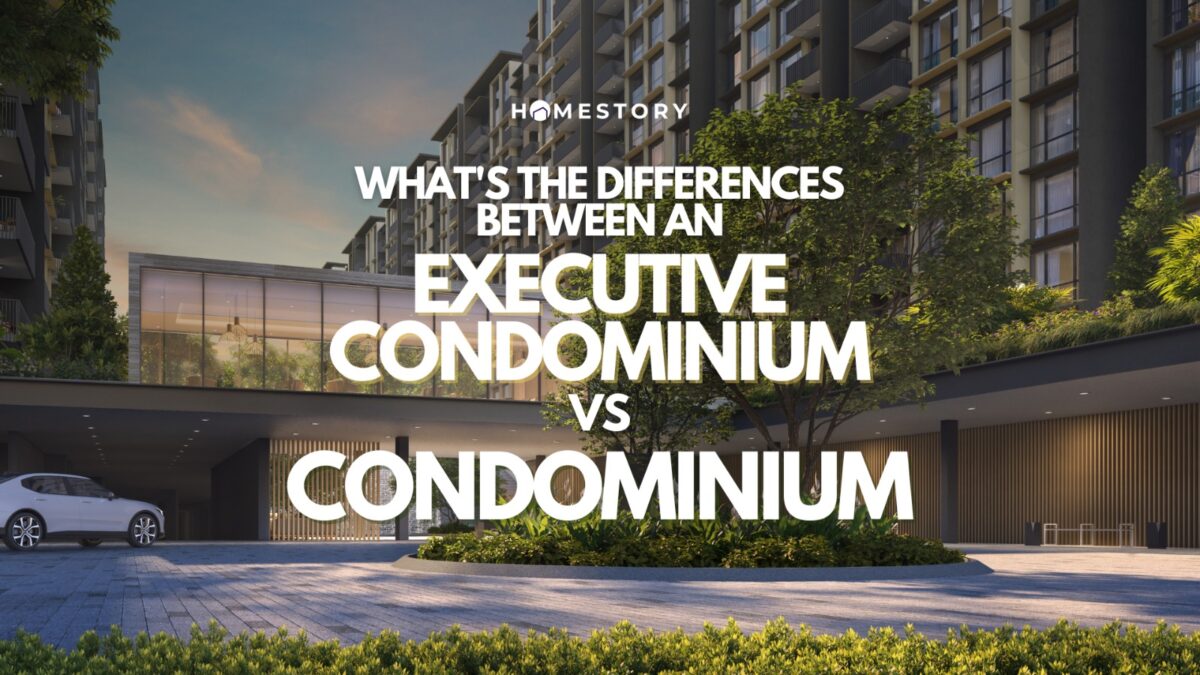The condo market is becoming more and more competitive with both executive condominiums (EC) and private condos being luxurious living close to the city. There seems little difference between them, so buyers have no choice but to take what they can get! What’s the difference between EC and a condo? Read this article to find out more!
There are a few aspects that make condos different from executive condominiums in Singapore. The most notable difference is the competitive price and promise of convenient living. The decision to buy a private condo or executive condominium in Singapore is not easy for potential home buyers. A person’s financial stability, preferences, and lifestyle are all considered when making this choice.
Housing options can be overwhelming, but that’s why we’re here! Continue reading to discover their differences.
What is an Executive Condominiums (EC) and Condos?
Executive Condominiums (EC) – It was first introduced by the Government in 1999. They are a hybrid type of housing that is categorized as a mix of public and private housing. They are built and managed by private developers but come at a cheaper price, as the land cost is subsidized by the government.
Condo – A condo is a form of private housing whereby individual portions of this land are owned by different owners. Likening EC units to cars, Khaw said that the scheme has given Singaporeans a chance to buy a luxury “Lexus” at (Toyota) “Corolla” prices.
MOP (Minimum Occupancy Period)
EC – MOP for EC is 5 years. After 5 years, semi privatizes can only sell to SC / SPR. After 10 Years From TOP, fully privatize no Restrictions to selling (Can sell to All SC / SPR / Foreigners.
Condo – MOP doesn’t apply to private Condos. There is a limitation on selling a regular condo, in the form of the Seller’s Stamp Duty (SSD). This stamp duty imposes a tax of 12% if you sell in the first year, 8% in the second year, and 4% in the third year. However, you’re free to sell without penalty from the fourth year onward. This is still two years shorter than the MOP.
Lease
EC – Lease for an EC is 99 years.
Condo – A condo lease can be 99 years or Freehold.
Grants
EC – Grants up to $30k.
Condo – No grants for a condo.
Resale Levy Payable
EC – For EC, the Resale levy is payable depending on your flat type and whether your resale application is on or after 3 March 2006. It also depends on your share of your first di flat.
Condo – For Condos, there is no resale levy payable.
ABSD
EC – When you buy a new EC, you don’t have to pay ABSD upfront. You do need to dispose of your home within six months after collecting the keys to your EC (or once your EC receives its Temporary Occupation Permit), but at least you don’t have to fork out the huge ABSD fee at the start (you may need to pay the HDB resale levy though).
Payment Scheme
EC – For ECs, you can choose between a Normal Progressive Payment Scheme or a Deferred Payment scheme. For the purchase of EC with a bank loan, you need to pass both criteria – MSR calculations followed by TDSR calculations. Your Mortgage servicing ratio (MSR) refers to the portion of a borrower’s gross monthly income that goes towards repaying all property loans, including the loan being applied for.MSR is capped at 30% of a borrower’s gross monthly income.
Condo – For condos, it only has a Normal Progressive Payment Scheme. For the purchase of a private condo, TDSR applies. The total debt servicing ratio (TDSR) refers to the portion of a borrower’s gross monthly income that goes towards repaying the monthly debt obligations, including the loan being applied for. A borrower’s TDSR should be less than or equal to 55%.
Others
EC – EC has other buying restrictions such as the family nucleus, citizenship, age, income ceiling, ownership of private properties, and other eligibility.
The decision to purchase an executive or private condo depends on your unique circumstances. One type may be better than the other if you have certain needs, but both will work well for many people in Singapore.
The EC is a great choice for those who want to call home or raise their family in the city. The majority of these developments are subsidized by the national government and situated near prime districts, which means they have many amenities at hand! Despite being limited by Minimum Occupancy Periods (MOPs), EC properties also make good investments because initially designed as housing instead long term investment objectives.
In contrast, private condos are the perfect investment for those who want to hold their property permanently.
We hope our article has helped you understand on the differences between EC and condo. Do contact us if you have any questions and don’t forget to check out our other articles!

